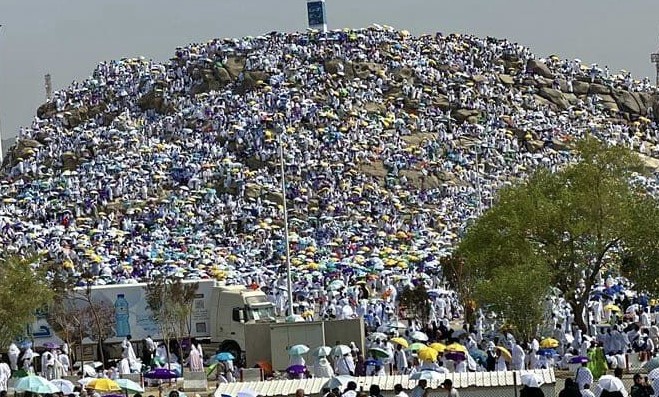The Islamic calendar holds many significant days, but a few carry the weight and spiritual significance of the day of Arafat.
Usually observed on the 9th of Dhul-Hijjah, the 12th and last month of the Islamic lunar calendar, Arafat is the cornerstone of the hajj pilgrimage and a time of immense blessings and potential forgiveness for pilgrims and other Muslims worldwide.
Today, over 1.5 million hajj pilgrims, clad in two pieces of white clothing, from all over the world are gathered to stand on the plains of Arafat, a vast expanse of granite hills east of Makkah, Saudi Arabia, to engage in intense prayer, supplication, and reflection.
Standing at Arafat by pilgrims, also known as “Wuquf,” has a significance that extends beyond the rituals of hajj; it marks several turning points in the history of Islam.
Advertisement
Men and women, regardless of age, race, tribe, and social status, come together and, in humility, offer prayers to their creator on this day.
The presence of a large crowd of Muslims wearing simple clothing on the vast plains of Arafat and begging Allah for mercy is a powerful image of humanity standing before their creator and a reminder of their dependence on His mercy.
A DAY OF COMPLETION AND DIVINE FAVOUR
Advertisement
The very essence of the day of Arafat lies in its connection to the perfection of the Islamic religion. It was on this day that Prophet Muhammad (S.A.W.) made his farewell sermon during his final pilgrimage and bore witness that Allah (SWT) has perfected His religion, completed His favours upon him, and approved Islam as the complete and perfect religion for humanity.
“This day I have perfected for you your religion, completed My favour upon you, and approved for you Islam as religion (Quran 5:3).”
This verse signifies the finality of Allah’s guidance for humankind. Islam has been presented and gradually modified by Allah through a long line of prophets and messages. The day of Arafat marks the completion of the divine religion.
SEEKING MERCY, FORGIVENESS AND RENEWAL
Advertisement
The day of Arafat is believed to be when forgiveness is readily available for those who seek it sincerely from Allah. Muslims around the world, even those unable to perform hajj, dedicate themselves to prayer, fasting, and acts of charity on the day.
Many hadiths (sayings of Prophet Muhammad) emphasise the importance of the day of Arafat. One narration describes it as a day when Allah descends upon the first heaven and boasts to the angels about the supplications and repentance of His servants on earth. Another narration says it is the day on which Allah forgives sins and frees his servants from hellfire more readily than any other day.
Also, the day is not just about seeking forgiveness; it is equally for deep reflection and spiritual renewal. Muslims are encouraged to contemplate their actions, mend broken relationships, and recommit themselves to living a life that pleases Allah.
The SACRIFICE OF OBIDIENCE
Advertisement
In Quran 37, verses 101–111, Allah commanded Prophet Ibrahim in his dreams to slaughter his only son, Prophet Ismail, in a sacrifice. Although saddened by the command, Prophet Ibrahim took his son and headed to Mount Arafat to obey Allah’s command.
At Mount Arafat, Prophet Ibrahim prepared for the sacrifice, bringing a knife and rope. He revealed the dream to his son, who displayed remarkable courage and piety. Ismail requested that his hands and feet be bound to minimise struggle and for Prophet Ibrahim to blindfold himself to lessen his grief.
Advertisement
Before Prophet Ibrahim could slaughter his son, Allah intervened by providing a ram as the sacrifice in replacement of Ismail.
This significant Mount Arafat event, known as Qarbani, represents a turning point in Islamic history and is commemorated every 10th of Dhul Hijjah as Eid al-Kabir. Muslims worldwide celebrate Eid-el-Kabir, and those capable of slaughtering rams do so in sacrifice and obedience to Allah.
Advertisement
In celebration, Muslims also gather for special prayers, wear new clothes, exchange gifts, and, most importantly, share the meat of the sacrificed animals with family, friends, and those in need.
Eid-el-Kabir is a time for reflection, gratitude, and strengthening family and community bonds. It is a reminder that true Islamic faith requires complete submission to Allah’s will, even in the face of immense personal sacrifice.
Advertisement
THINGS TO DO ON ARAFAT DAY
While the rituals of hajj are reserved for pilgrims, Muslims worldwide can participate in the spiritual significance of the day of Arafat.
Some ways to observe this day include: observe fasting on the day of Arafat, for it is reported in the sayings of Prophet Muhammad that it expiates the sins of the previous year and the coming year.
Also, Muslims are encouraged to increase their good deeds and acts of worship, seeking the nearness and pleasure of Allah on this day.
The day of Arafat is a day of answered prayers, a time when Allah showers His mercy and forgiveness upon those who sincerely seek it. The Prophet enjoined Muslims to pour their hearts out in abundant duas, seeking forgiveness and praying for success in their mundane affairs as well as in religious standing.
Also, Muslims are expected to spend more time reciting the Quran and also give charity on the day while also offering more voluntary prayers.
It is also a moment to reflect on the farewell sermon of Prophet Muhammad and extend a helping hand to those in need, amplifying your blessings while supporting others.
Add a comment








